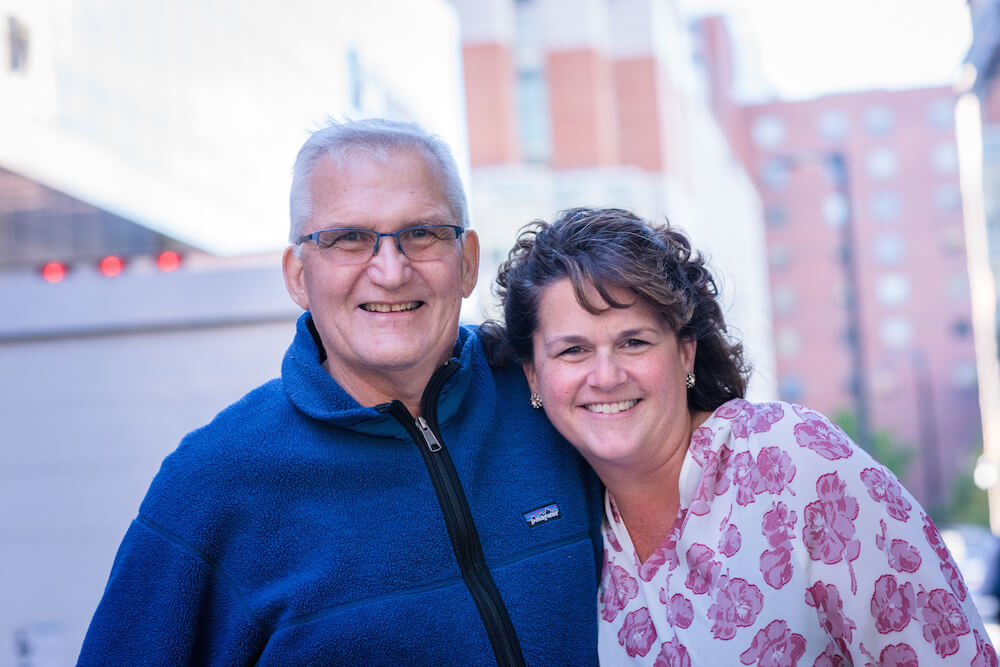As father and daughter, there are many things Dennis Gorden and Becky Nutley share: a contagious smile, the instinct to help others, and a commitment to family, to name a few. But one thing they never imagined they would have in common was a cancer diagnosis.
In 2014, routine blood work revealed that Becky Nutley, then 39, had smoldering multiple myeloma, an incurable cancer of the bone marrow involving plasma cells. The diagnosis caught the high school guidance counselor and mother of two off-guard—at the time, she felt she had been in the best shape of her life.
“It was like I was frozen; I couldn’t move,” Nutley recalls. “I was so worried about my kids because we didn’t understand everything that was happening.”
Nutley immediately began treatment under the care of Irene Ghobrial, MD, director of the Center for Prevention of Progression of Blood Cancers (CPOP) at Dana-Farber. Her parents, Dennis and Nancy Gorden, regularly drove from New York to Massachusetts to help take care of their grandkids. Nutley says the silver lining then was that her diagnosis brought a tight knit family even closer together.

Because Nutley was still not having any symptoms, since the cancer had not progressed to her organs, Ghobrial elected to place her on an immunotherapy clinical trial. Nutley stayed in remission for two years, but her myeloma progressed following the conclusion of the trial. In 2017, she underwent a stem cell transplant, and her cancer has been at bay ever since.
Proactive treatment—as opposed to reactive treatment—is not the current standard of care for treating smoldering myeloma. However, Ghobrial believes in the power of early intervention, and has made that a key research focus for herself at the Center for Prevention of Progression of Blood Cancers. So as Nutley’s condition worsened, neither her or Ghobrial wanted to wait for the disease to progress further.
“Early therapy can make a difference,” says Ghobrial. “We want to improve the standard of care, and not just stand still.”
“I was ready to attack this,” adds Nutley. “I felt good that we were doing something about it.”
When Nutley was in recovery from her stem cell transplant in March 2018, her father was diagnosed with muscle invasive bladder cancer. It was now Nutley’s turn to offer support to her father, and having experienced care at Dana-Farber firsthand, she urged her father to come to Boston for treatment.
Gorden saw Guru P. Sonpavde, MD, who is the bladder cancer director at the Lank Center for Genitourinary Oncology. Gorden first received neoadjuvant (pre-operative) chemotherapy before undergoing a robotic radical cystectomy in August to remove his bladder, prostate, and surrounding lymph nodes. Pathologic examination of the bladder showed the chemo had worked to eradicate cancer, and today, Gorden is cancer-free.
Gorden’s success is typical in about 30 percent of patients with muscle invasive bladder cancer. In an effort to improve these results, Dana-Farber has since opened a clinical trial that is testing the effectiveness of neoadjuvant chemotherapy and immunotherapy in patients.
Now that Gorden is post-surgery, Nutley makes sure her father gets the exercise he needs to stay active and healthy. The two take long walks together and use their time to talk about their lives and experiences with cancer.
“It’s all worked out really great,” says Gorden. “Taking Becky’s advice to come to Dana-Farber was the best decision I made.”
“It’s been helpful to go through this together,” Nutley adds.

Your are both amazing! ❤️
So glad you both are doing so well! Love you ❤️
Becky, you are amazing! Think of you often! Hope everyone is doing well!